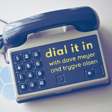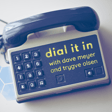
S2 Ep19 The Intersection of Healthcare and Marketing with Stephen Fogg
This episode of Dial It In features Stephen Fogg, the head of Fogg Media, a healthcare marketing agency based in North Carolina. Stephen specializes in marketing for healthcare specialty groups like orthopedics, gastroenterology, and anesthesiology. He discusses the importance of specialty marketing and his agency's focus on B2B services in the healthcare industry. Tune in to learn more about Stephen's background and expertise in the field of marketing.
…
Dial It In Podcast is where we gathered our favorite people together to share their advice on how to drive revenue, through storytelling and without the boring sales jargon. Our primary focus is marketing and sales for manufacturing and B2B service businesses, but we’ll cover topics across the entire spectrum of business. This isn’t a deep, naval-gazing show… we like to have lively chats that are fun, and full of useful insights. Brought to you by BizzyWeb.
Links:
Website: dialitinpodcast.com
BizzyWeb site: bizzyweb.com
Connect with Dave Meyer
Connect with Trygve Olsen

